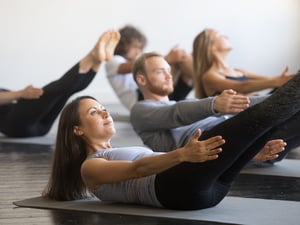Breathe for Your Life Health & Wellbeing
Breath is life. Life is breath. The yoga sages of India have embraced this link for centuries, where conscious breathing has long been an integral part of daily life. More recently, Western researchers have also begun to acknowledge the importance of the breath. As data accumulates, they are beginning to acknowledge that perhaps breathing is a far more important metabolic process than previously believed.
The Trouble with Shallow Breathing
Because most of us are not aware of our breathing, we don’t use our full breathing capacity. But inefficient or poor breathing can result in low energy, high stress and toxicity levels, and a sluggish emotional state. When done properly on the other hand, breathing can have a tremendous impact on mental, physical, and spiritual health. Shallow breathing does not provide sufficient oxygen to our brain or other cells in our bodies. Insufficient oxygen in the tissues, known as hypoxia, has been linked with degenerative disease. When our oxygen level is depleted, our body’s ability to detoxify itself is depleted, as well. This increases our susceptibility to illness and disease. Shallow, rushed breathing aggravates stress, asthma, fatigue, insomnia, and many other ailments. Shallow breathing fails to produce the natural flow of our internal organs and fluids that is created by deeper, more natural breathing.
Emotions & Breath
Emotions and breath are also linked. Pain can interrupt the breathing process altogether, causing you to “forget” to breathe each time the pain strikes. Undoubtedly, emotions can disrupt the natural flow of breathing, which in turn can diminish your energy.
While taking in more oxygen is important, it may not be as important as its distribution. Oxygen consumption and distribution is best accomplished when we are serene and peaceful. During meditation, for example, circulation within the muscles is significantly increased. Relaxation allows us to breathe more effectively, and breathing more effectively allows us to relax.
Catch the Wave
When we breathe fully and deeply, the diaphragm goes down during inhalation and up during exhalation. The more the diaphragm moves, the more our lungs expand. This produces a gentle, wave-like motion that naturally stimulates and detoxifies our inner organs.
You can teach yourself to breathe deeply, but it is a subtle learning process that requires perseverance and practice. Initially, you may feel discouraged or as though you aren’t doing anything. Try lying on your back, and placing your hand on your abdomen. Always breathe through your nose and out through your mouth, evenly, steadily, and deeply. Feel your abdomen inflate on the inhalation and deflate on the exhalation. Once you feel comfortable, sit upright and practice deep breathing in the vertical position.
Below are a few suggestions for incorporating deep breathing into your daily life:
 Yoga, the Sanskrit word for union, allows you to unite body, mind, and spirit into a balanced whole. Yoga combines poses, deep breathing, and relaxation. Many people experience an energy boost soon after starting even the most basic yoga program. Hatha yoga, in particular, is designed for relaxing and releasing deep body tension, bringing balance to the nervous system, and stimulating internal organ function. Breathing evenly, without strain, is a primary component of hatha yoga.
Yoga, the Sanskrit word for union, allows you to unite body, mind, and spirit into a balanced whole. Yoga combines poses, deep breathing, and relaxation. Many people experience an energy boost soon after starting even the most basic yoga program. Hatha yoga, in particular, is designed for relaxing and releasing deep body tension, bringing balance to the nervous system, and stimulating internal organ function. Breathing evenly, without strain, is a primary component of hatha yoga.
The Alexander Technique, founded by Frederick Alexander, is a gentle process of relaxation, motion and awareness that incorporates breath, mind and body.
Tai Chi is an ancient Chinese system of slow and graceful motion that benefits body, mind, and spirit. Literally translated, tai means big or great, and chi means ultimate energy. Through gentle, yet powerful dance-like movement, Tai Chi stimulates a freeing flow of energy. Each movement is accompanied by the breath. Gradually, the deeper, more conscious breathing becomes more natural.
Stop and take some time to focus on your breathing. Doing so can benefit your body, mind, and spirit.
© 2018 Liberty Publishing, Inc. All rights reserved. Distributed by Financial Media Exchange.
FMeX


